De Frans-Roemeense schrijver Eugène Ionesco werd geboren op 26 november 1912 in Slatina, Roemenië. Zie ook alle tags voor Eugène Ionesco op dit blog.
Uit: The Bold Soprano
„SCENE: A middle-class English interior, with English armchairs. An English evening. Mr. Smith, an Englishman, seated in his English armchair and wearing English slippers, is smoking his English pipe and reading an English newspaper, near an English fire. He is wearing English spectacles and a small gray English mustache. Beside him, in another English armchair, Mrs. Smith, an Englishwoman, is darning some English socks. A long moment of English silence. The English clock strikes 17 English strokes.
MRS. SMITH: There, it’s nine o’clock. We’ve drunk the soup, and eaten the fish and chips, and the English salad. The children have drunk English water. We’ve eaten well this evening. That’s because we live in the suburbs of London and because our name is Smith.
MR. SMITH [continues to read, clicks his toungue.]
MRS. SMITH: Potatoes are very good fried in fat; the salad oil was not rancid. The oil from the grocer at the corner is better quality than the oil from the grocer across the street. It is even better than the oil from the grocer at the bottom of the street. However, I prefer not to tell them that their oil is bad.
MR. SMITH [continues to read, clicks his tongue.]
MRS. SMITH: However, the oil from the grocer at the corner is still the best.
MR. SMITH [continues to read, clicks his tongue.]
MRS. SMITH: Mary did the potatoes very well, this evening. The last time she did not do them well. I do not like them when they are well done.
MR. SMITH [continues to read, clicks his tongue.]
MRS. SMITH: The fish was fresh. It made my mouth water. I had two helpings. No, three helpings. That made me go to the w.c. You also had three helpings. However, the third time you took less than the first two times, while as for me, I took a great deal more. I eat better than you this evening. Why is that? Usually, it is you who eats more. It is not appetite you lack.
MR. SMITH [clicks his tongue.]
MRS. SMITH: But still, the soup was perhaps a little too salt. It was saltier than you. Ha, ha, ha. It also had too many leeks and not enough onions. I regret I didn’t advise Mary to add some aniseed stars. The next time I’ll know better.“
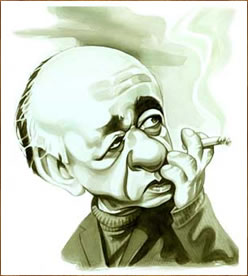
Eugène Ionesco (26 november 1912 – 28 maart 1994)
De Amerikaanse schrijfster Marilynne Robinson werd geboren in Sandpoint, Idaho op 26 november 1943. Zie ook alle tags voor Marilynne Robonson op dit blog.
Uit: Housekeeping
“My name is Ruth. I grew up with my youngersister, Lucille, under the care of my grandmother, Mrs.Sylvia Foster, and when she died, of her sisters-in-law,Misses Lily and Nona Foster, and when they fled, ofher daughter, Mrs. Sylvia Fisher. Through all thesegenerations of elders we lived in one house, my grandmother’shouse, built for her by her husband, EdmundFoster, an employee of the railroad, who escaped thisworld years before I entered it. It was he who put usdown in this unlikely place. He had grown up in theMiddle West, in a house dug out of the ground, withwindows just at earth level and just at eye level, so thatfrom without, the house was a mere mound, no more ahuman stronghold than a grave, and from within, theperfect horizontality of the world in that place foreshortenedthe view so severely that the horizon seemedto circumscribe the sod house and nothing more. Somy grandfather began to read what he could find oftravel literature, journals of expeditions to the mountainsof Africa, to the Alps, the Andes, the Himalayas,the Rockies. He bought a box of colors and copied amagazine lithograph of a Japanese painting of Fujiyama.He painted many more mountains, none of them identifiable,if any of them were real. They were all suavecones or mounds, single or in heaps or clusters, green,brown, or white, depending on the season, but alwayssnowcapped, these caps being pink, white, or gold, dependingon the time of day. In one large painting he hadput a bell-shaped mountain in the very foreground andcovered it with meticulously painted trees, each of whichstood out at right angles to the ground, where it grewexactly as the nap stands outon folded plush. Every treebore bright fruit, and showy birds nested in the boughs,and every fruit and bird was plumb with the warp in theearth. Oversized beasts, spotted and striped, could beseen running unimpeded up the right side and unhasteneddown the left. Whether the genius of thispainting was ignorance or fancy I never could decide.“
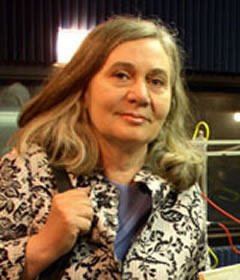
Marilynne Robinson (Sandpoint, 26 november 1943)
De Argentijnse schrijfster Luisa Valenzuela werd geboren op 26 november 1938 in Buenos Aires. Zie ook alle tags voor Luisa Valenzuela op dit blog.
Uit: I’m your horse in the night (Vertaald door Deborah Bonner)
„The doorbell rang: three short rings and one long one. That was the signal, and I got up, annoyed and a little frightened; it could be them, and then again, maybe not; at these ungodly hours of the night it could be a trap. I opened the door expecting anything except him, face to face, at last.
He came in quickly and locked the door behind him before embracing me. So much in character, so cautious, first and foremost checking his – our – rear guard. Then he took me in his arms without saying a word, not even holding me too tight but letting all the emotions of our new encounter overflow, telling me so much by merely holding me in his arms and kissing me slowly. I think he never had much faith in words, and there he was, as silent as ever, sending me messages in the form of caresses.
We finally stepped back to look at one another from head to foot, not eye to eye, out of focus. And I was able to say Hello showing scarcely any surprise despite all those months when I had no idea where he could have been, and I was able to say
I though you were fighting up north
I thought you’d been caught
I thought you were in hiding
I thought you’d been tortured and killed
I thought you were theorizing about the revolution in another country.
Just one of many ways to tell him I’d been thinking of him. I hadn’t stopped thinking of him or felt as if I’d been betrayed. And there he was, always so goddamn cautious, so much the master of his actions.
“Quiet, Chiquita. You’re much better off not knowing what I’ve been up to.”
Then he pulled out is treasures, potential clues than at the time eluded me: a bottle of cachaca and a Gal Costa record. What had he been up to in Brazil? What was he planning to do next? What had brought him back, risking his life, knowing they were after him? Then I stopped asking myself questions (quiet, Chiquita, he’d say). Come here Chiquita, he was saying, and I chose to let myself sink into the joy of having him back again, trying not to worry. What would happen to us tomorrow, and the days that followed?“
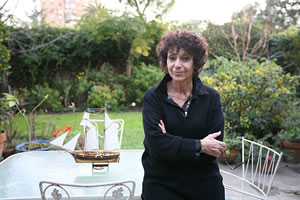
Luisa Valenzuela (Buenos Aires, 26 november 1938)
De Engelse dichter William Cowper werd geboren op 26 november 1731 in Berkhamstead, Herford. Zie ook alle tags voor William Cowper op dit blog.
Retirement
Far from the world, O Lord, I flee,
From strife and tumult far;
From scenes where Satan wages still
His most successful war.
The calm retreat, the silent shade,
With prayer and praise agree;
And seem, by Thy sweet bounty made,
For those who follow Thee.
There if Thy Spirit touch the soul,
And grace her mean abode,
Oh, with what peace, and joy, and love,
She communes with her God!
There like the nightingale she pours
Her solitary lays;
Nor asks a witness of her song,
Nor thirsts for human praise.
Author and Guardian of my life,
Sweet source of light Divine,
And, — all harmonious names in one, —
My Saviour! Thou art mine.
What thanks I owe Thee, and what love,
A boundless, endless store,
Shall echo through the realms above,
When time shall be no more.
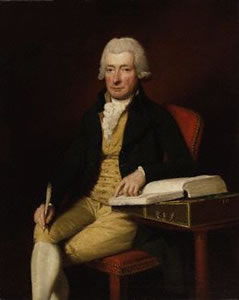
William Cowper (26 november 1731 – 25 april 1800)
Portret door Lemuel Francis Abbott, 1792
De Vlaamse dichter, schrijver en columnist Louis Verbeeck werd geboren in Tessenderlo op 26 november 1932. Zie ook alle tags voor Louis Verbeeck op dit blog.
Opa
Er was eens een grootvader op een portret,
Die vroeger veel bloempjes had buitengezet,
hij hing aan de schouw en soms dacht hij met spijt
Nog even terug aan die heerlijke tijd.
De heerlijke tijd van de sjarreleston,
die niemand kon dansen gelijk hij dat kon.
Soms welde er dan fluks een traan naar zijn oog,
maar hij kon niet huilen: portretten staan droog.
Soms kijkt men naar hem en men murmelt heel zoet:
“Ach ach, wat was opa toch braaf en toch goed!”
Dan heeft hij veel last om zijn lach in te houden,
want ze hebben hem nooit gekend voor hij trouwde.
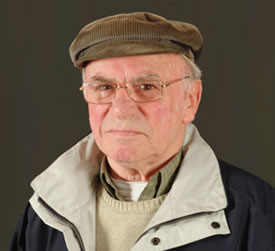
Louis Verbeeck (Tessenderlo, 26 november 1932)
Foto: Theo Klerkx, Hasselt
Onafhankelijk van geboortedata:
De Duitse schrijver René Becher werd geboren in 1977 in Bayreuth. Zie ook mijn blog van 26 november 2009.
Uit: Schreien
„Dann haben mir die Schweine auch noch die Elfi weggenommen. Ich saß gerade an meiner Novelle, auf meiner sandfarbenen Couch, stand vor dem tuberkulösen Spiegel im Bad, da musste es passiert sein. Diese Saftsäcke! Wo sie mir doch bereits im Juli des vorangegangenen Jahres den toten Säugling Sven von der Terrasse stibitzt hatten. Ich erinnere mich noch gut: Ich ließ die Rollläden ab, in der Ferne sah ich Leuchtraketen in den Himmel steigen, sie hatten gewonnen. Wollte schon schreien. Die Wurstigkeit hatte sich endgültig Bahn gebrochen, wie auch Bärbel jetzt sagen würde, wäre sie verdammtnochmal hier.
Und was hätte ich dem Sven nicht noch alles beibringen können? Ich hätte ihm vielleicht Geschichten vorgetragen. Die wahnwitzigen Räuberpistolen eines Wilhelm Hauff beispielsweise, als das Wünschen noch half, und Sven hätte gewiehert vor Glück und ich hätte mit ihm gelacht, hätte ihm Sprache beigebracht (vielleicht), ihm gezeigt, wie man schreibt (wohl eher nicht).
Im vergangenen Jahr beschäftigte ich mich noch mit Büchern. Ich nahm ein Buch aus dem Regal (wahrscheinlich den Pascal, den Storm, das Autorenlexikon, und ich vergewisserte mich, dass im Zeichen des Zwillings geborene Schriftsteller die allerschlimmsten sind) und stellte es wieder zurück.
Das Bücherregal in der Ecke meines Wohnzimmers. Darin Bücher, die in zweiterdritter Reihe parkten, Zettel zwischen Seite 112/113.
Zettelwirtschaft auf meinem Schreibtisch, zum Kotzen! Also verschob ich die Bücher, ordnete sie dem Alphabet nach, säuberte daraufhin meinen Schreibtisch, trat einen Schritt zurück und beguckte, was ich da eben angerichtet hatte.“
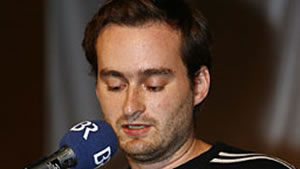
René Becher (Bayreuth, 1977
